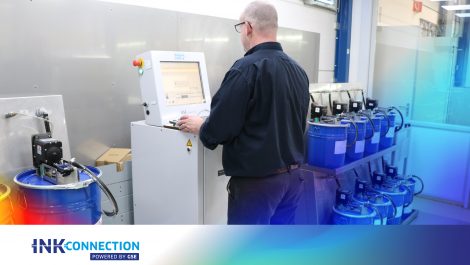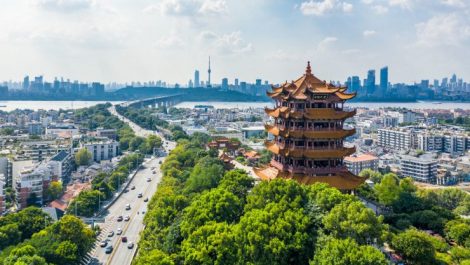With lockdowns seemingly easing across the world the time has come for people across all countries and industries to start thinking about what the ‘New Normal’ will look like when we all go back to work. Last week FlexoTech spoke to key figures from industry bodies, manufacturers and software providers, this week it is the turn of printers and converters.
Watershed
Understandably many of the people we spoke with stressed both the uncertainty which continues to reign, and the importance of prioritising the health and safety of employees, supplies and stakeholders.
Both these points were emphasised by Liz Waters, managing director at Irish supplier of self-adhesive labels and packaging, Watershed, ‘Obviously the virus is presenting the packaging industry with a new set of challenges,’ Ms Waters said. ‘As with all crises, the impact will vary depending on the sector and portfolio. The packaging industry is a key industry supplier and will have to become even more alert to changing consumer trends and adapt accordingly. Changes in work practices are having an enormous daily effect both from a practical and psychological point of view. Teams that normally interact daily are divided and may no longer meet. It is even more important to have effective HR processes in place to support employees through this difficult period.

Liz Waters (right), pictured after installing a Mark Andy Digital Series hybrid press
‘A key priority will continue to be the health of our teams and how best to protect and support them. This will require changes in work practices, such as social distancing, dividing employees into shifts and teams where operationally possible and the provision of PPE. It will also require additional management input into monitoring and maintaining targeted and clearly defined processes if these changes are to succeed. Ongoing and effective communications and regular updates will be vital both internally and with suppliers. The SLT are spending considerable time defining what the ‘New Normal’ will look like and its effect on both productivity and growth. Stress testing all our reporting channels to determine whether or not they are robust enough to cope with increased remote work practices that will exclude one to one meetings for the foreseeable future, is a key issue. Whether or not these changes will be permanent remains to be seen as it is harder to maintain a company culture without physical interaction. A critical factor will be the timing of a vaccine and or effective anti-viral treatments.’
When it comes to the development and release of new technologies, Ms Waters thinks the pandemic will have ‘an enormous effect.’ She told FlexoTech, ‘Many financial institutions have suspended their lending for CAPEX investments and most packaging companies will be reluctant to invest in a volatile market where their customer base might shrink from falling demand or bankruptcy. Many tech companies are currently furloughing in response to the virus so it seems unlikely that there will be any significant new releases.‘
Baker Labels
If Ms Water’s last view sounds a little ominous, there are alternatives. Baker Label’s managing director Steve Baker believes that, ‘New technologies and ideas normally get fast tracked in bad times due to the need to get goods that are unique/faster/better/cheaper. Whether PSPs be able to buy them is a different question, if interest rates remain low and the government wants to stimulate the economy then money will be available but if the recession is deep then companies will pull back on spending.’

Steve Baker says that the biggest change the industry faces will be the potential reduction in work for a long period
But that’s product development, what does Mr Baker anticipate will be the biggest change the industry has to adjust to? ‘I think the most significant aspect will be the potential reduction in work for a long period. I cannot see that we will just bounce back to normal when this is over and the potential economic effect of this could be devastating for many businesses, even the more established ones. Companies will be reassessing how many staff they are able to bring back after furlough and the unemployment rate will probably shoot up causing reduction in demand for goods and services.’
And in terms of day-to-day life for people working in the sector? ‘Flexible working will become more the norm now that working from home has been properly tested and everyone is now more comfortable working on video conferencing. Face-to-face meetings will need to be more justified from suppliers – driving miles or flying somewhere for a meeting will definitely need to be done only when there is no possibility of doing it remotely. Cleanliness of working areas and sanitising stations will be the norm and this will improve general health as well as protect against the virus. We all know social distancing will be around for a good 12 months so working areas will need to be adapted to help accommodate this.’
Hamilton Adhesive Labels
Paul Larkin, operations director at Hamilton Adhesive Labels, says that one of the most significant things that the pandemic has done is to make us all aware of just how easily infections can spread, ‘whether that’s the common cold or something more serious.’
As such he can see many of the changes that companies have put in place already staying in place, at least for the moment. Mr Larkin says the procedures his Leicester-based business has implemented are ‘comprehensive,’ with the aim being ‘to reduce to a minimum the possibility of cross infection.’

Paul Larkin believes that many of the measures introduced during the crisis could be with us for a while
These measures include changes that would have been unthinkable and include, but aren’t limited to a maximum of four staff allowed in the canteen at any one time, all locker rooms being closed, 30 minute cleans of each press with IPA at the end of every press, no shift crossovers (with staff from one shift having to leave the building 15 minutes before the next shift arrives) and, of course, social distancing to be maintained at all time.
‘That is just a sample,’ Mr Larking stresses, ‘We have had to implement dozens of new procedures to protect our employees. Our general BRC procedures are deemed robust in protecting employees, and satisfying the hygienic demands of our customers. I’m sure that some procedures from Coronavirus will stay in place, however I do believe that when the Pandemic is over the strictest procedures will relax.
‘The outbreak has put the whole world into lockdown, the impact has been profound, and completely stifled the development and release of new technology, (you can only do so much through Zoom before you need to feel or touch an idea). As people get used to the new norm, I feel that the imminent relaxing of restrictions will begin to ignite this area. Forward thinking enterprises will always want to be ahead of the game, however I think it will be a very slow start.’
Hatzopoulos
Elef Kassianidis, Hatzopoulos’ sales director for the UK and Ireland, brought up the social changes that he thought, or at least hoped, would remain in place after the crisis is over. ‘I can only speculate,’ Mr Kassianidis said, ‘In which case I would like to outline a personal vision of the form I would ideally like society to take. On an interpersonal level, I would like the higher levels of compassion, cooperation, thoughtfulness and understanding to become permanent features. On a professional level, I would like to see the physical and emotional wellbeing of people being placed at the epicentre of corporate culture and action on sustainability/environment preservation being accelerated.’

Elef Kassianidis feels we should strive to maintain some social changes after the crisis is over
Admirable no doubt, but what about changes to working practices and day-to-day routines, what does Mr Kassianidis anticipate on that front? ‘In the intermediary phase between lockdown and normality, it would be requisite, or at least advisable, that social distancing measures be maintained. For that reason, remote working for the majority of administrative personnel will become a permanent feature; on manufacturing shop floors, however, that will have a profoundly adverse effect on shift patterns and production KPIs.
‘Additionally, countless finely-tuned supply chains on a pan-European level will be further disrupted as they re-adjust to the operational restart (no matter how gradual) of the foodservice/HORECA sector and the concomitant decline of demand in the retail sector as rebalancing between the two eventually takes place.’
When it comes to new products and technologies Mr Kassianidis said that ‘The notion of circularity cannot be abandoned.’ He also thought that the development of fully recyclable, all-PE films, the imminent introduction of the Plastics Tax and popular demand means that efforts and investment levels will persist.
Interket
When it came to new technologies Vince Hughes, coatings and technical manager at Interket, said that, ‘If anything, the outbreak has allowed businesses to diversify where they can and enter market sectors they are not typically recognised in because of shortages in supply chains. OEM’s will certainly look at technologies with a new perspective, possibly reducing the amount of human interaction for certain operations.’
When it comes to changes in how businesses will operate Mr Hughes added, ‘Reduced travel will be a major factor now that Microsoft Teams meetings have become part of everyday life. Foreign travel will be significantly reduced along with supplier visits, which may not be deemed as necessary as they did before as a consequence of this form of communication.

Vince Hughes is certain that travel will be massively reduced
‘Although good practice for hygiene in the workplace was always a major consideration, this has now been taken to a new level and I do not see that being relaxed once things return to some sort of normality. We continue to follow government guidelines and are changing working practices as and when instructed.’
One positive Mr Hughes pointed out was the supply chain. When asked if he had any concerns on this front he said, ‘Last month, if you had asked that question, I would have most definitely said, yes! Since the panic buying habits of the general public in the early days of the outbreak have calmed, we have seen a realignment of stock availability. The concern is whether components of the supply chain, which were taken for granted before, are harder to come by as a result of smaller businesses, which support the industry, are no longer in existence. Availability of PPE will be one to look out for and suppliers commanding inflated prices in the short term.’






